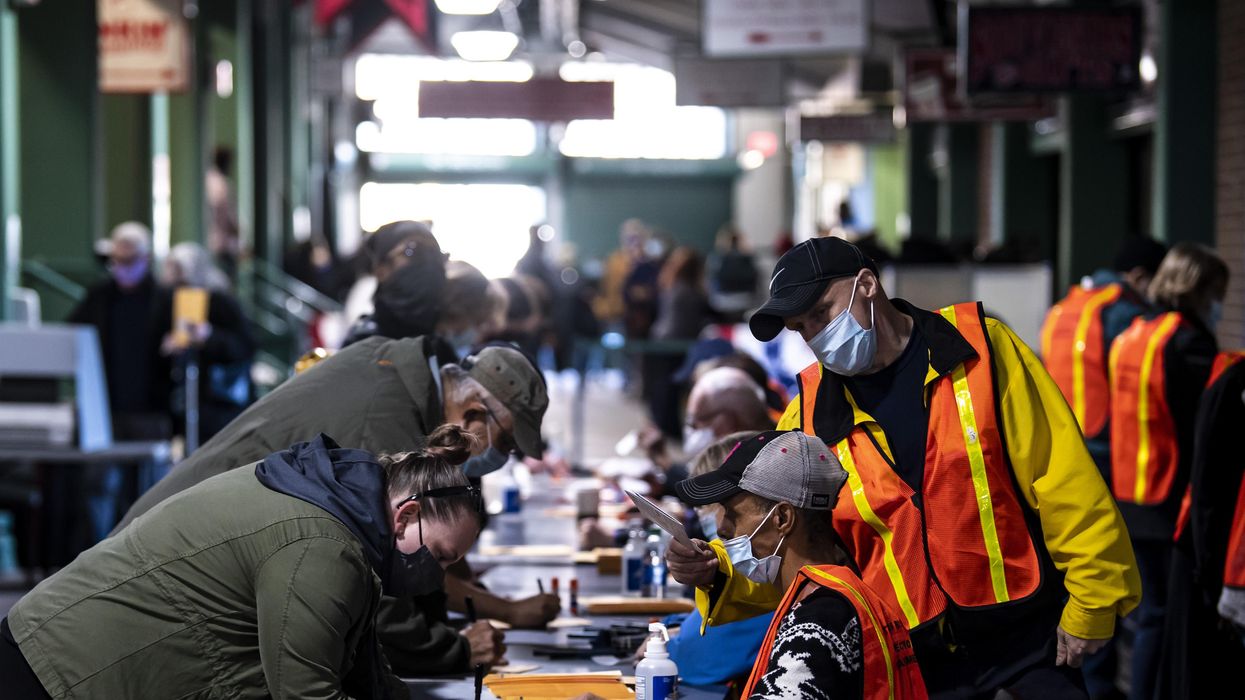Voting rights advocates are looking fearfully at early efforts by Republicans in legislatures across the country to reverse many of the 2020 ballot access easements inspired by the pandemic. But an exception to the trend looks to be blooming in deep blue Massachusetts.
The state's top elections official, Secretary of State Bill Galvin, said Tuesday that he will push to make permanent last year's temporary expansions of voting by mail and early in-person voting, which caused turnout in November to smash state records.
The announcement is a signal development because Galvin has developed significant clout among his fellow Democrats in lopsided control of the legislature during his 25 years in office, longer than any other statewide official.
His proposal would repeal the state's strict excuse requirements for obtaining an absentee ballot — which, like those in 11 other states, were suspended last year in order to promote turnout and protect voters from exposure to the coronavirus. At least seven of the others, all with GOP-majority legislatures, look very likely to resume making voters justify the need to vote by mail.
The easement worked as dramatically in Massachusetts as any other state, boosting the share of votes delivered in an envelope more than tenfold, from 3 percent in 2016 to 42 percent in November.
"While voting by mail may not always be used to the same extent as the pandemic finally ends, my office has heard from many voters who have made it clear that they want this option to remain available for all future elections," Galvin said.
Another 23 percent of the presidential election vote was cast in person before Election Day after the state extended that option's availability to two full weeks, including weekends, from the previous 11 weekdays. Galvin's bill would continue that timetable indefinitely, as well, while creating a new seven-straight-day window before the primaries and permitting municipalities to begin offering early voting in local elections.
The Brennan Center for Justice now counts 165 pieces of legislation introduced in 33 states as of Monday that would restrict future voting access — mainly by limiting mail-in ballots, implementing new voter ID requirements or curtailing registration. At this point a year ago, the progressive think tank says, there had been only 35 bills to curb voting proposed in 15 state capitals.)
The biggest legislative bursts this year have been in three states that Biden carried last fall but with legislatures controlled by the GOP: Arizona, Pennsylvania and Georgia.
Far more measures, 541 of them, have been filed in the past month to expand voting access, Brennan says. But — unlike in Massachusetts — the bulk have been written by Democrats in legislatures firmly in GOP control.
The two relaxations of the rules in the Bay State boosted turnout to a record 73 percent, well above the national share of those eligible who voted and a 400,000-person increase from 2016 even though almost no contests on any ballot in the state were competitive. (President Biden locked in the 11 electoral votes by a margin of 30 points, extending the Democtratic streak in the state to nine.)
Galvin's legislative proposal would also make Massachusetts the 22nd state where eligible people can register and vote on Election Day. The cutoff for getting on the rolls is now 20 days ahead of time, one of the earliest deadlines in the country.
Legislation to do what the secretary of state wants has already been filed by two influential Democratic legislators, Sen. Cynthia Creem and Rep. John Lawn. "In these days of voter suppression we need to make it easier for people," Creem said.
Republicans, who hold just one of every six seats on Beacon Hill, say they are mainly concerned about the costs of continuing last year's easements. A handful also contended that the switch to no-excuse mail voting for 2020 was not allowed under the state constitutional, although in December they dropped a lawsuit pressing that argument.
"We have such phenomenal access to voting in Massachusetts," GOP Rep. Nicholas Boldyga told the Boston Herald. "Making mail-in ballots permanent — I know I'm not there yet. I think we have a long way to go and I don't think it's necessary going forward unless there are extreme circumstances like a pandemic."




















Marco Rubio is the only adult left in the room